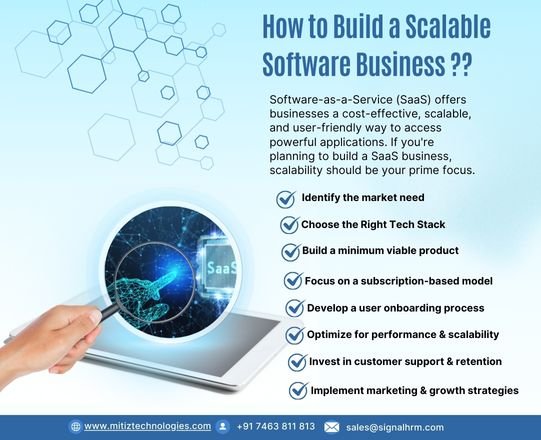
Software-as-a-Service (SaaS) offers businesses a cost-effective, scalable, and user-friendly way to access powerful applications. If you're planning to build a SaaS business, scalability should be your prime focus. A well-structured SaaS product can allow multiple users to access the product and manages workloads without affecting performance. In this blog, we’ll step-by-step learn how to build a scalable SaaS business.
1. Identify the
market need: Before your
start, you need to validate your SaaS idea. To do this, start by researching
your target audience and identifying a pain point that your software can solve.
Carry out market research, analyze competitors, and gather insights from
potential customers.
2. Choose the Right Tech Stack: The technology you choose will
determine the scalability, security, and maintainability of your SaaS platform.
You’ll need a cloud-based infrastructure, microservices architecture, programming
languages, and a database.
3. Build a minimum
viable product: Instead
of launching a fully-featured product, start with an MVP. An MVP is a simple
version of your software that addresses the needs of users. This helps you to
test your idea, gather user feedback, and make improvements before scaling.
4. Focus on
a subscription-based model: Offer
different pricing plans such as freemium, basic, premium to attract a broad
customer base. Ensure that your pricing aligns with the value your software
provides.
5. Develop a
user onboarding process: Create
an onboarding process to help users to get started and use your software
effectively. This includes interactive tutorials and guides, chatbots, and knowledge
base.
7. Optimize for performance & scalability: A scalable SaaS application should be
able to handle high traffic loads without impacting user experience. Use auto-scaling
servers to adjust resources dynamically and content delivery networks (CDNs)
for faster load times.
8. Invest in
customer support & retention: Acquiring
customers is costly, therefore businesses must retain them by provide excellent
customer support through live chat, email, and community forums. Update your
software with new features and fixe bugs based on user feedback.
9. Implement marketing & growth strategies: A well-planned marketing strategy is important
for scaling your SaaS business. Use SEO & content marketing to attract
organic traffic, referral programs to encourage user sign-ups, and integrations
with other SaaS tools.
Conclusion
Building a scalable SaaS business requires technical expertise, customer-centric development, and marketing strategies. Our professionals at Mitiz help you to build SaaS software for your need, optimize performance, ensuring customer satisfaction.